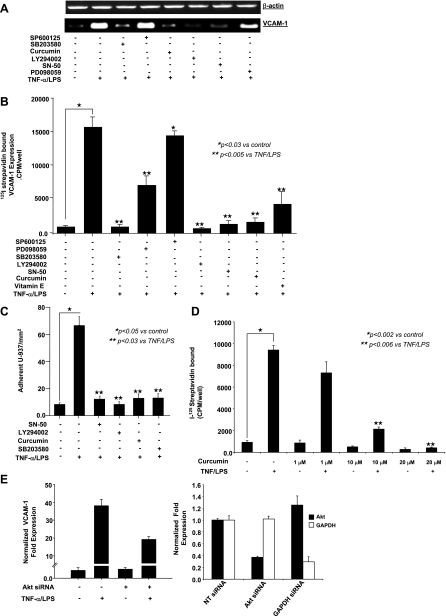Fig. 5.
Effect of pharmacological inhibitors on VCAM-1 expression. A: VCAM-1 mRNA expression in TNF-α/LPS-activated HIMEC was completely inhibited by SB-203580 (p38 MAPK inhibitor), LY-294002 (PI 3-kinase/Akt inhibitor), SN-50 [nuclear factor (NF)-κB inhibitor], and curcumin. Pretreatment of HIMEC with PD-098059 (p44/42 MAPK inhibitor) resulted in partial inhibition of VCAM-1 mRNA, whereas SP-600125 (JNK inhibitor) did not alter VCAM-1 expression following TNF-α/LPS. B: VCAM-1 cell surface expression was significantly inhibited by SB-203580, curcumin, LY-294002, SN-50, and vitamin E (lipid-soluble antioxidant) but not SP-600125 and was partially blocked by PD-098059. C: function of VCAM-1 expression in TNF-α/LPS-activated HIMEC was assessed using low shear stress flow adhesion assays and binding of U-937 monocytes, which are known to express α4-integrins. U-937 monocyte adhesion to TNF-α/LPS-activated HIMEC was inhibited by SN-50, LY-294002, curcumin, and SB-203580 pretreatment. D: inhibitory effect of curcumin on VCAM-1 expression was dose dependent, and a maximal inhibitory effect was achieved by 10 μM of curcumin pretreatment of HIMEC 30 min before TNF-α/LPS activation. E: Akt gene silencing in HIMEC. With the use of appropriate controls [glyceraldehyde-3-phosphate dehydrogenase [GAPDH small-interfering RNA (siRNA) as a positive control and nontargeting (NT) siRNA as a negative control], specific knockdown of Akt by Akt siRNA was demonstrated by real-time PCR (right). After significant silencing of Akt expression was confirmed, the effect on VCAM-1 expression after TNF-α/LPS stimulation was measured by real-time PCR (left). Data are expressed as the mean normalized fold expression above baseline of 3 individual experiments ± SD. Data shown are from one of three independent experiments.

